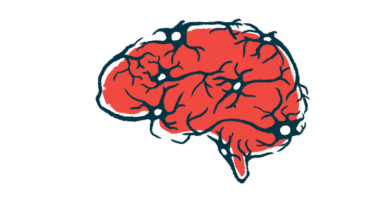PoNS Device for MS-associated Gait Problems Now Available in US

The portable neuromodulation stimulator (PoNS) device, which improves walking abilities in people with multiple sclerosis (MS), is now available commercially in the U.S. for patients ages 22 and older who have a prescription from their healthcare provider.
The device was approved last year by the U.S. Food and Drug Administration (FDA), which stipulated that it could be used for the short-term treatment of gait problems due to mild or moderate MS in conjunction with supervised physical therapy.
The device may help MS patients in the U.S. see improvements in mobility, disability, and quality of life, according to its developer, Helius Medical Technologies.
“Approximately 40 percent of individuals with MS will need walking assistance within 15 years of the onset of the disease. PoNS therapy provides a unique opportunity for these patients to improve gait functionality and mobility,” Antonella Favit-Van Pelt, MD, PhD, Helius’ chief medical officer, said in a press release.
Walking difficulties are among the most common symptoms of MS. Often, walking can be improved with physical therapy, stretching, and assistive walking devices, sometimes in combination with medication.
PoNS is a noninvasive portable device consisting of a mouthpiece that’s connected via a cord to a controller worn around the neck.
When placed on the tongue, the mouthpiece delivers a light electrical stimulation to two nerves, called cranial nerves, which send electrical signals to the brain. These electrical signals promote neuroplasticity, a process wherein the brain adapts and rewires in response to new experiences. This is thought to promote the strength of brain circuits involved in movement and enhance the benefits of physical therapy in people with mild-to-moderate MS.
“We believe that we are unlocking the full potential of neuromodulation and neuroplasticity to help MS patients walk more steadily and safely,” Favit-Van Pelt said.
Treating physicians and physical therapists can also connect the controller to a computer to monitor PoNS usage, giving them a better sense of whether patients are adhering to their therapy regimen.
Helius recently launched the Therapeutic Experience Program, in which the company will partner with 10 to 12 interested neurologists or neuro-rehabilitation therapists to help them learn more about PoNS technology, which they can then use to advise the medical community. Last year, New York University-Langone Health became the first center to participate in the program.
The FDA’s approval of PoNS was based largely on findings from two clinical trials. The first (NCT04498039) showed that among 20 people with MS-related walking problems, patients who received PoNS in combination with an exercise program had greater improvements in gait compared with those who only completed the exercise program.
A second, similarly designed trial (NCT04496531), sponsored by Helius, again showed that among 14 patients, those who received PoNS stimulation with physical and cognitive rehab saw greater balance improvements after 14 weeks (about 3.5 months) compared with those who received rehab only.
No serious side effects were reported in either trial.
PoNS was designated a breakthrough device for treating MS walking impairments in 2020. Its eventual approval took place through the FDA’s de novo pathway, which is used for devices for which there are no comparable alternatives already being marketed in the U.S.
PoNS is also approved in Canada and Australia for short-term use in MS patients in addition to physical therapy.
Helius is investigating PoNS use for treating gait and balance deficits after stroke, an indication for which the device also has a breakthrough designation. An upcoming clinical trial (NCT05135533) led by investigators at the Medical University of South Carolina will evaluate the effects of PoNS on gait recovery and stability after a stroke.







